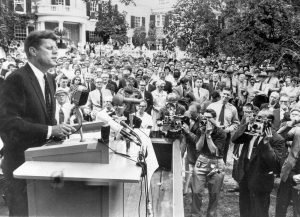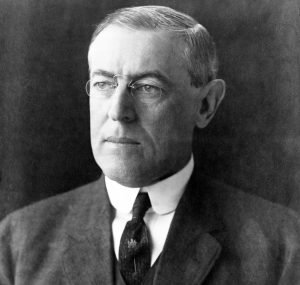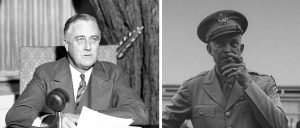When the President Gets Sick: A Brief History of Presidential Illness

When President Donald Trump was diagnosed with COVID-19, the announcement caused a frenzy of speculation about what it would mean for the country. COVID-19 is a dangerous disease generally, but at 74, the president is in at least one high-risk category. While it appears he is recovering well, the episode raises the question of how prepared the country is for a president to suffer an incapacitating or disabling health crisis.
No matter who the president is, the possibility of him succumbing to illness or injury in office is a serious matter. The president of the United States is the most powerful person in the world. He possesses the sole authority to launch nuclear weapons and virtually unfettered authority to initiate conventional military action. That’s not to mention his executive authority over the vast machinery of the US government. If there’s potential for his death or incapacity, it is an enormous opportunity for enemies and a threat for allies.
The Trump administration has been less than forthcoming regarding the president’s health, partly due to political concerns. Such a course of action is not unique to this White House. Americans have elected many men who found themselves victims of various infirmities. Very few administrations have handled them in a forthright manner, and usually only when hiding them would have been impossible.

President Ronald Reagan is one example of this. Reagan’s injuries from his attempted assassination in 1981 were far more serious than the public was made aware of at the time. While much was made of his returning to work shortly after the incident, the truth was that he nearly died. Some contend that the lingering aftereffects burdened Reagan for the rest of his presidency, but such short-term deception was likely justified by the need to project strength during a tension-filled period of the Cold War.
More troubling than a few days’ worth of half-truths are ongoing efforts to conceal long-term health problems of a president, especially when the country is at a critical juncture or facing major challenges. When those infirmities affect mental acuity and emotional regulation, withholding this information becomes not just troubling, but reckless.
In the modern age, the best example of such deception might be President John F. Kennedy. His assassination precipitated the 25th Amendment — what if Oswald’s bullet had merely inflicted a severe brain injury? But Kennedy’s case illustrates another troubling issue that has never been fully addressed.
Kennedy suffered from a series of illnesses that were concerning in and of themselves: chronic severe back pain, colitis, and Addison’s disease (a serious adrenal gland disorder) among others. More importantly, the treatments for those diseases likely compromised Kennedy’s mental and emotional state — he frequently took opioids, barbiturates, stimulants, and steroids.

Keep in mind that the effects of these drugs were not fully understood at the time, certainly not in combination. While we will likely never know how his medications affected his mental state, it certainly would have been relevant at the time.
Kennedy was president during some of the most tense moments of the Cold War, including the Bay of Pigs and the Cuban missile crisis. The missile crisis ended without disaster; the Bay of Pigs, however, didn’t go so well, especially for the Cubans who attempted the invasion.
A more extreme example was President Woodrow Wilson, who famously had a severe stroke in 1919. His wife, Ellen, basically ran the White House for more than a year. While World War I was over, this was still a critical time. Wilson was trying to establish the League of Nations, and for lack of American enactment of the treaty, the nascent organization fell apart.

This stroke should not have been a surprise, though. Wilson had multiple strokes prior to the one that left him incapacitated, as well as indications of other cardiovascular disease that were unmistakable even then. Again, whether one supported Wilson’s policies or not, American voters hired him to do a job, not his wife.
Presidents are not immune to severe health problems, many of which may affect their abilities to serve. Eisenhower had a heart attack and stroke; Franklin Roosevelt had heart disease in addition to his well-known battle with polio.
The 25th Amendment provides for succession if the president declares himself unfit, either temporarily or by resignation. This has been employed many times for events such as when the president is under anesthesia for medical procedures. It also allows for the vice president and a majority of the Cabinet to find the president unfit.
The act of running for president itself requires enormous self-regard. Everyone who becomes president is convinced he is the best person to face the challenges of the office. Relinquishing it for a few hours is one thing; admitting that one’s ailments have rendered one unable to continue is another.

Barring an obvious and extreme scenario like a bullet lodged in the president’s brain, it’s similarly almost inconceivable that any vice president would seek to declare the president incompetent, especially in today’s hyperpartisan environment. Such a move would be seen as an unforgivable display of political surrender. Regardless of party, the temptation to do a Weekend at Bernie’s for the rest of a term would be nearly irresistible.
Putting the particulars of today’s candidates aside, they are 74 and 77. There is a not-insignificant chance that either could face an incapacitating illness during his presidency. There really is no law that adequately addresses all the possible contingencies. So the US has to rely on the judgment of its voters to pick the president who is most likely to remain at full strength for his full term of office and most likely to objectively assess his own abilities if he cannot.
The national security challenges the US will face in coming years will likely move far faster than those of Wilson, Kennedy, or even Reagan. There’s nothing in our system to fix this potential problem other than the judgment of the voters.
Sometimes the person is nearly as important as the policy. Transparency and honesty on health issues are not just a character issue, but a national security one.

BRCC and Bad Moon Print Press team up for an exclusive, limited-edition T-shirt design!
BRCC partners with Team Room Design for an exclusive T-shirt release!
Thirty Seconds Out has partnered with BRCC for an exclusive shirt design invoking the God of Winter.
Lucas O'Hara of Grizzly Forge has teamed up with BRCC for a badass, exclusive Shirt Club T-shirt design featuring his most popular knife and tiomahawk.
Coffee or Die sits down with one of the graphic designers behind Black Rifle Coffee's signature look and vibe.
Biden will award the Medal of Honor to a Vietnam War Army helicopter pilot who risked his life to save a reconnaissance team from almost certain death.
Ever wonder how much Jack Mandaville would f*ck sh*t up if he went back in time? The American Revolution didn't even see him coming.
A nearly 200-year-old West Point time capsule that at first appeared to yield little more than dust contains hidden treasure, the US Military Academy said.












